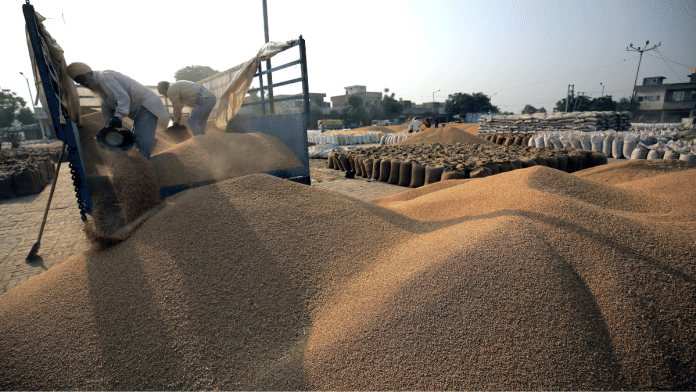New Delhi: The Indian government has approved the selling of surplus wheat and rice from its reserves under the Open Market Sale Scheme (OMSS) to private players from August in a bid to improve inventory management and regulate prices.
An order from the Ministry of Consumer Affairs, Food and Public Distribution, accessed by ThePrint, has allowed the state-run Food Corporation of India (FCI) to commence selling wheat from its inventory to private players via e-auction at a reserve price of Rs 2,325 per quintal. This price is 3.22 percent lower than the current market rate of Rs 2,400 per quintal.
For rice, the government has set the price at Rs 2,800 per quintal for private buyers, compared to the market price of Rs 2,888.33 per quintal, reflecting a 3.15 percent reduction.
These prices exclude transportation charges from FCI depots. According to an official note, the exact quantity of grain stocks to be released will be determined by FCI in consultation with the ministry, after keeping the stock required for the public distribution system (PDS), buffer norms, and an additional two metric tons (MT).
Last year, FCI had begun selling wheat to private players in June, and sold over 10 million metric tons in the fiscal year ending March 2024, marking a record sale from state reserves.
Wheat prices in India have experienced a 6 percent year-on-year inflation.
As of 1 July, FCI holds 28.26 MT of wheat stock against the buffer norm of 27.58 MT, which is just 0.68 MT more than the minimum value. The official note indicated that after meeting the requirement for the PDS and other welfare schemes, which is approximately 18.4 MT, sufficient wheat stock will be available for market interventions as needed.
Previously on 1 May, 2024, wheat stocks in Indian government warehouses fell 10.3 percent year-over-year to their lowest level since 2008, after two years of poor crops, which had led to the sale of record volumes of the staple crop to increase domestic supply and cut local prices. According to FCI estimates, wheat stockpiles in state stores in May this year were 26 million metric tons, down from 29 million metric tons in May 2023.
In the case of rice, the government has a substantial surplus of more than 47.49 MT, against a buffer norm of 13.54 MT, as of 1 July.
Also Read: 94% of agricultural & allied output out of MSP net, govt needs to find alternatives, says SBI report
What is OMSS?
Under the Open Market Sale Scheme, FCI periodically sells surplus food grains, particularly wheat and rice, from the central pool in the open market to traders, bulk consumers and retail chains at predetermined prices. This is conducted through e-auctions, allowing open market bidders to purchase specified quantities at the start of a cycle, with prices being routinely revised.
States are also permitted to procure food grains through OMSS without participating in the auctions for their needs beyond what they receive from the central pool for distribution to National Food Security Act (NFSA) beneficiaries.
The OMSS is typically activated during the lean season — the period between harvests — to improve and regulate the domestic supply and availability of the grains, and to reduce their prices in the open market. Essentially, the scheme aims to curb food grain inflation.
(Edited by Mannat Chugh)
Also Read: Marginal farmers consistently lost over 50% crops in past 5 yrs due to extreme climate conditions






